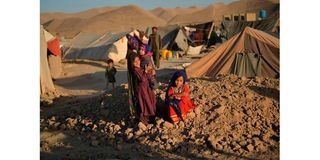Hunger forces Afghans to sell young daughters into marriage

Asho (right), a little girl betrothed to a 23-year-old man to whose family was indebted, sitting outside a tent at the Shamal Darya internally displaced people camp in Qala-i-Naw, Badghis Province, on October 14, 2021.
What you need to know:
- Child marriage has been practised in Afghanistan for centuries, but war and climate change-related poverty have driven many families to resort to striking deals earlier and earlier in girls’ lives.
- Village and displaced people’s camp leaders say the numbers of young girls getting betrothed started to rise during a 2018 famine and surged this year when the rains failed once more.
Qala i Naw, Afghanistan, Tuesday
Fahima has wept many times since her husband sold their two young daughters into marriage to survive the drought gripping western Afghanistan.
Oblivious to the deal, six-year-old Faristeh and 18-month-old Shokriya sit by her side in a mud-brick and tarpaulin shelter for displaced people.
“My husband said if we don’t give away our daughters, we will all die because we don’t have anything to eat,” Fahima said of the choice now facing thousands of Afghan families.
“I feel bad giving away my daughters for money.”
Future husbands
The oldest commanded a bride price of Ksh370,000 ($3,350) and the toddler Ksh310,000 ($2,800) — to be paid in instalments over several years until the time comes to join their new families, their future husbands still minors themselves.
Child marriage has been practised in Afghanistan for centuries, but war and climate change-related poverty have driven many families to resort to striking deals earlier and earlier in girls’ lives.
Boys’ parents can drive a harder bargain and secure younger girls, spacing out the repayments.
The World Food Programme warned Monday that more than half the population of Afghanistan, around 22.8 million people, will face acute food insecurity from November.
In Qala-i-Naw, capital of the western province of Badghis — one of the region’s worst affected by the drought — there is shame and grief.
Village and displaced people’s camp leaders say the numbers of young girls getting betrothed started to rise during a 2018 famine and surged this year when the rains failed once more.
Dozen families
Among farmers driven from their homes, AFP journalists quickly found more than a dozen families who felt forced to sell their daughters into marriage.
Fahima’s 25-year-old neighbour in the camp, Sabehreh, ran up a bill at a grocer’s shop to feed her family. The business owner warned that they would be jailed if they could not repay him.
To cover the debt, the family agreed that their three-year-old daughter, Zakereh, would be betrothed to the grocer’s four-year-old son, Zabiuallah.
The infants are ignorant of their future fate, the shopkeeper having elected to wait until the pair are older before taking charge of the girl’s upkeep.
“I’m not happy to have done that, but we had nothing to eat or drink,” Sabehreh told AFP.
Another neighbour, Gul Bibi, confirmed that many families in the camp had resorted to child marriage.
Her own daughter Asho, aged eight or nine, is betrothed to a 23-year-old man to whose family Gul Bibi was indebted. The young man is away in nearby Iran, and she dreads the day of his return.
In another Qala-i-Naw camp, Mohammad Assan wiped back his tears as he showed AFP photos of his girls, Siana, nine, and Edi Gul, six, now living far away with their young grooms.
Temporary camp
“We’ve never seen them since,” he said. “We didn’t want to do that, but we had to feed our other children.”
Like many others, Assan and his family sought shelter in the temporary camp during the fierce fighting in recent years as the now victorious Taliban clawed back control of the country from the US-backed government.
“My daughters are surely better off over there, with food to eat,” he reasoned, trying to console himself as he showed AFP the crusts of bread his neighbours spared for him.
Assan’s wife is sick and he has medical bills to pay, so he has already begun looking for a suitor for his remaining four-year-old daughter.
Camp elder Abdul Rahim Akbar does what he can to save his neighbours from having to make the awful choice, distributing a small ration of bread to the poorest families.
He has even been to see the area’s new Taliban authorities to seek their assistance.
The Taliban’s interim governor for Badghis province, Maulvi Abdul Sattar, told AFP: “These child marriages are due to economic problems, not to any rule imposed by the Islamic emirate, or the Sharia.”
(AFP)





